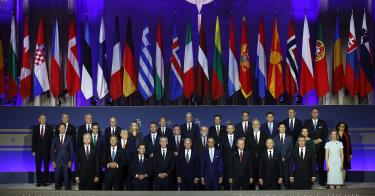Prompted by this week’s NATO summit in Washington, much of the discussion in American defense circles will focus on comparing levels of military aid to Ukraine—and encouraging Europeans to spend more on their own defense.
For those in the American conservative movement who want the U.S. to focus more on the Indo-Pacific, these are important conversations. Those in this camp should continue emphasizing the importance of meeting (if not exceeding) the 2 percent minimum spending requirement for NATO members, and urge Europeans to take the lead on supporting Ukraine.
Further, Americans who champion a shift to the Indo-Pacific should be encouraging Europeans to take primary responsibility for their own defense. These Europeans should be looking for ways to shift the burden from the U.S. military to European militaries—and soon—as a way of freeing up American resources to deter China.
>>> EU Should Prioritize Defense, Not Climate Change Funding
Germany has announced that it will be establishing a permanently stationed brigade in Lithuania by 2027 (as opposed to bases with a rotating presence). The base will be modeled after American bases in Germany, with housing for soldiers and their families and base amenities. This sends a clear message in terms of commitment to the defense of the Baltics by NATO and should be applauded.
Estonia and Latvia deserve similar reassurances. European countries could send a real message that they are taking primary responsibility for the security by establishing permanent bases in Estonia and Latvia the same way Germany is in Lithuania (with the approval and coordination of the host governments, of course). In all cases, the focus should be on moving combat power to the Baltics as quickly as possible to provide reassurance and deterrence in the Baltics.
Even within supranational constructs like the European Union or NATO, the interests of nation-states play a role. Italy is never going to be as invested in protecting NATO’s eastern flank as Poland is. Individual NATO members should play to their strengths in a complementary manner, with Mediterranean countries like Italy, France, and Greece using their navies to police the Red Sea and Mediterranean, by both preventing attacks on shipping and targeting the Houthis disrupting commerce.
The French, Italians, and Greeks all have substantial fleets and an interest in safeguarding the trade route leading to Europe through the Red Sea. Yet the United States is currently taking the lead on bombing the Houthis in Yemen, using munitions it desperately needs to conserve for the Indo-Pacific.
The United States does not need to lead efforts in every security concern. In fact, Americans should encourage Europeans to take the initiative in security issues that are of secondary or tertiary importance to the United States.
>>> German Brigade Entering Lithuania Is a Welcome Change for NATO
For example, Portugal conducts partner-building exercises and counter-narcotics and counter-piracy operations in the Gulf of Guinea. Portugal, with its unique history in the region, its understanding of the players and issues—and its access to bases—is uniquely situated to conduct operations in the Gulf of Guinea. The United States can act as an enabler in a limited capacity if there are available resources, but should encourage Portugal to assume the central role in the region.
Europeans can also take over the mission in Kosovo (KFOR) by providing either the overwhelming majority or the entirety of the force stationed at Camp Bondsteel. U.S. Secretary of the Army Christine E. Wormuth herself recently floated the idea of dramatically reducing the American presence in Kosovo as a way of freeing up personnel and funding for more critical missions elsewhere. The mission in Kosovo has been static for decades. Europeans are more than capable of handling it with little or no additional resources provided by the U.S.
The U.S. will also continue to act as a key enabler in certain sensing and air defense missions for some time while Europeans develop their own capabilities—ideally sped up through increased tech sharing and weapons sales approved by the Department of State for transfer to NATO allies.
By taking on these additional roles, Europeans can free up American forces and resources to focus on deterring China in the Indo-Pacific. At the same time, the U.S. will maintain existing capabilities in Europe and provide critical enabling capabilities to the European forces providing the bulk of conventional deterrence in Europe.
This piece originally appeared in The American Conservative




